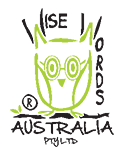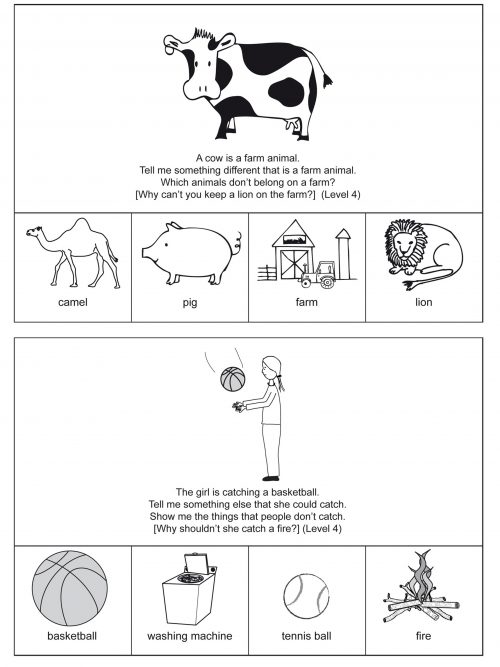-
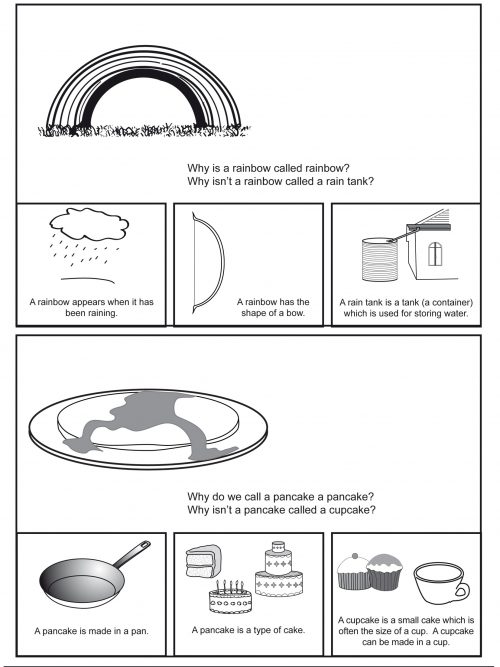
Level 4
Explaining the Logic of Compound Words Level 4 “Why is a ... called a ...?” “Why isn’t a ... called a ...?” “Why do we call this a ... ?” A Compound Word is formed when two or more words, which can stand alone, are joined to make a new word. The new word takes on a new meaning (button + hole = buttonhole, foot + ball = football). This program has been designed to help your child to recognise and explain the reasoning behind compound words. Explaining the logic of compound words is a Blank’s Level 4 level of understanding and makes it necessary for your child to use language to talk about language. At this level, the questions and statements pose more complex verbal problems and will require your child to reason and predict. Asking your child to explain why a ‘waterfall’ is called a ‘waterfall’ requires him/her to analyse the presented word and recognise that it is comprised of two individual words. In addition, he/she needs to understand that the individual words have different meanings when they stand alone. Example of a task/activity “Why is a rainbow called a rainbow?” You should point to the picture of the rainbow and say the following... “This is a rainbow.” Next, you ask your child the question: “Why is a rainbow called a rainbow?” If his/her response is incorrect or inadequate you should point to and talk with your child about the first two smaller pictures below the rainbow. “This is rain. A rainbow appears when it has been raining." Next, talk about the second picture: "Look this is a bow. A rainbow has the shape of a bow.” Now that you have explained the two components of the word ‘rainbow', you should ask again the question relating to the compound word: “Why is a rainbow called a rainbow?” “Why isn’t a rainbow called a rain tank?” Point to the rainbow and then point to and talk about the picture of the rain tank. Ask: “Why isn’t a rainbow called a rain tank?” You may need to help your child focus on the relevant features in the picture by talking more about the rain tank. In this way you will be simplifying the question further. -
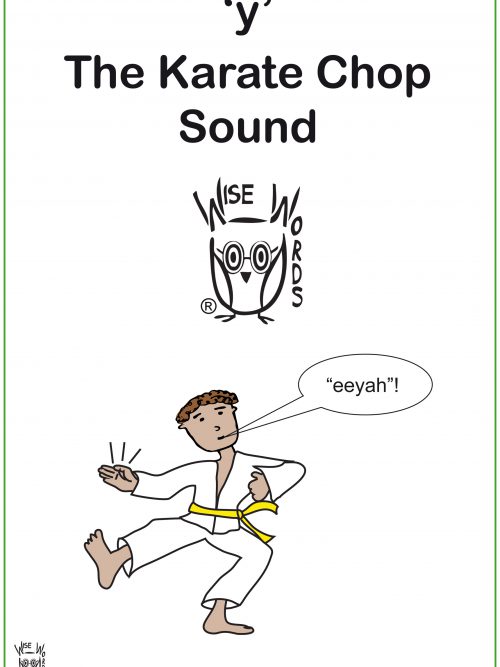 Y - The Karate Chop Sound Wise Words Articulation Programs - support clinicians, teachers and parents to establish 'new' (correct) sounds into their child's speech. Each program supplies detailed instructions for every task and game. The instructions have been written in a clear manner for a non-professional to follow. Numerous games are provided. These games have been designed to be fun and interactive and will ensure that the child remains engaged and compliant. Playing the games will help the child to generalise the ‘new’ sound into their everyday speech.
Y - The Karate Chop Sound Wise Words Articulation Programs - support clinicians, teachers and parents to establish 'new' (correct) sounds into their child's speech. Each program supplies detailed instructions for every task and game. The instructions have been written in a clear manner for a non-professional to follow. Numerous games are provided. These games have been designed to be fun and interactive and will ensure that the child remains engaged and compliant. Playing the games will help the child to generalise the ‘new’ sound into their everyday speech. -
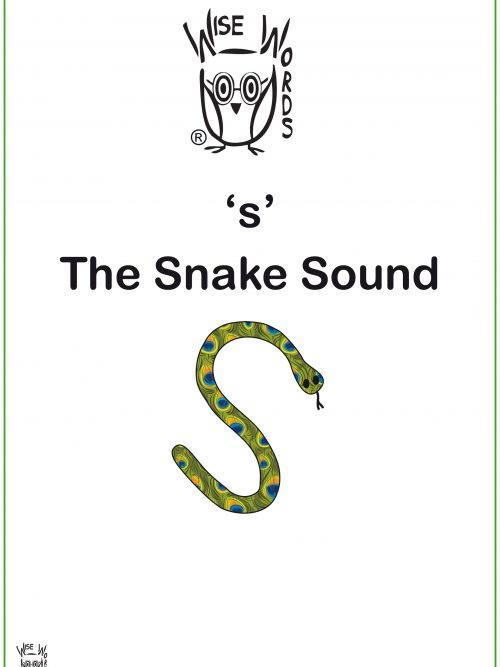 Wise Words Articulation Programs - support clinicians, teachers and parents to establish 'new' (correct) sounds into their child's speech. Each program supplies detailed instructions for every task and game. The instructions have been written in a clear manner for a non-professional to follow. Numerous games are provided. These games have been designed to be fun and interactive and will ensure that the child remains engaged and compliant. Playing the games will help the child to generalise the ‘new’ sound into their everyday speech.
Wise Words Articulation Programs - support clinicians, teachers and parents to establish 'new' (correct) sounds into their child's speech. Each program supplies detailed instructions for every task and game. The instructions have been written in a clear manner for a non-professional to follow. Numerous games are provided. These games have been designed to be fun and interactive and will ensure that the child remains engaged and compliant. Playing the games will help the child to generalise the ‘new’ sound into their everyday speech. -
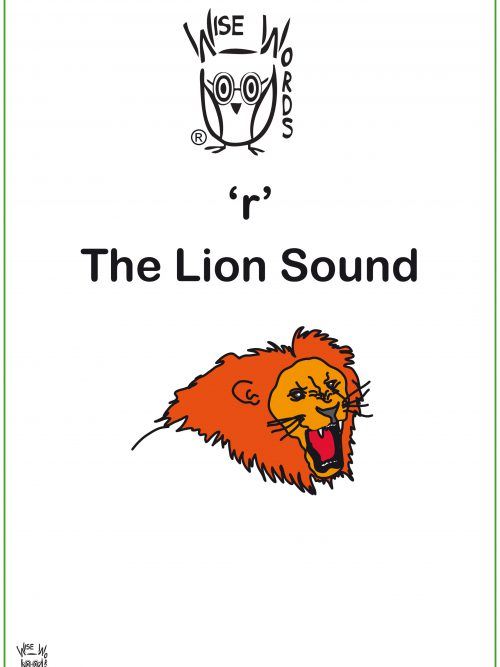 Wise Words Articulation Programs - support clinicians, teachers and parents to establish 'new' (correct) sounds into their child's speech. Each program supplies detailed instructions for every task and game. The instructions have been written in a clear manner for a non-professional to follow. Numerous games are provided. These games have been designed to be fun and interactive and will ensure that the child remains engaged and compliant. Playing the games will help the child to generalise the ‘new’ sound into their everyday speech..
Wise Words Articulation Programs - support clinicians, teachers and parents to establish 'new' (correct) sounds into their child's speech. Each program supplies detailed instructions for every task and game. The instructions have been written in a clear manner for a non-professional to follow. Numerous games are provided. These games have been designed to be fun and interactive and will ensure that the child remains engaged and compliant. Playing the games will help the child to generalise the ‘new’ sound into their everyday speech.. -
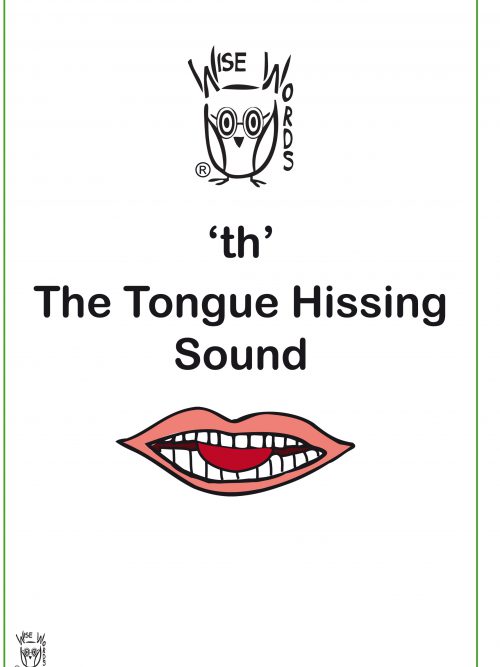 Wise Words Articulation Programs support clinicians, teachers and parents to establish 'new' (correct) sounds into their child's speech. Each program supplies detailed instructions for every task and game. The instructions have been written in a clear manner for a non-professional to follow. Numerous games are provided. These games have been designed to be fun and interactive and will ensure that the child remains engaged and compliant. Playing the games will help the child to generalise the ‘new’ sound into their everyday speech.
Wise Words Articulation Programs support clinicians, teachers and parents to establish 'new' (correct) sounds into their child's speech. Each program supplies detailed instructions for every task and game. The instructions have been written in a clear manner for a non-professional to follow. Numerous games are provided. These games have been designed to be fun and interactive and will ensure that the child remains engaged and compliant. Playing the games will help the child to generalise the ‘new’ sound into their everyday speech. -
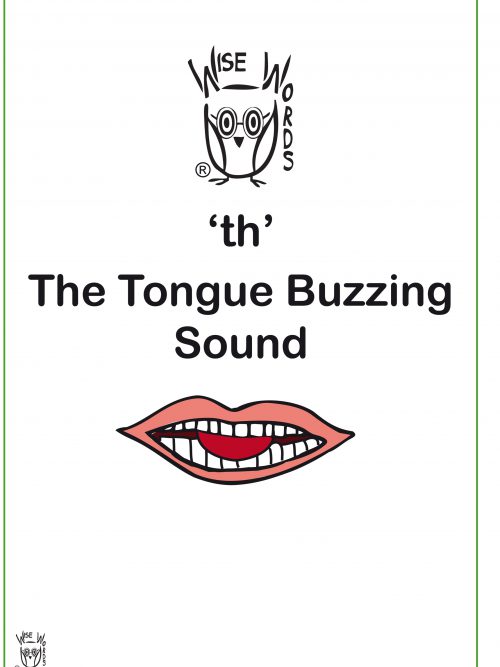 Wise Words Articulation Programs support clinicians, teachers and parents to establish 'new' (correct) sounds into their child's speech. Each program supplies detailed instructions for every task and game. The instructions have been written in a clear manner for a non-professional to follow. Numerous games are provided. These games have been designed to be fun and interactive and will ensure that the child remains engaged and compliant. Playing the games will help the child to generalise the ‘new’ sound into their everyday speech.
Wise Words Articulation Programs support clinicians, teachers and parents to establish 'new' (correct) sounds into their child's speech. Each program supplies detailed instructions for every task and game. The instructions have been written in a clear manner for a non-professional to follow. Numerous games are provided. These games have been designed to be fun and interactive and will ensure that the child remains engaged and compliant. Playing the games will help the child to generalise the ‘new’ sound into their everyday speech. -
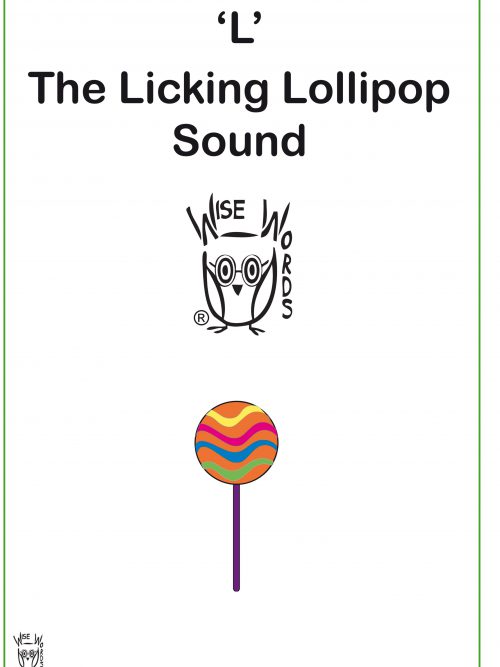 Wise Words Articulation Programs - support clinicians, teachers and parents to establish 'new' (correct) sounds into their child's speech. Each program supplies detailed instructions for every task and game. The instructions have been written in a clear manner for a non-professional to follow. Numerous games are provided. These games have been designed to be fun and interactive and will ensure that the child remains engaged and compliant. Playing the games will help the child to generalise the ‘new’ sound into their everyday speech.
Wise Words Articulation Programs - support clinicians, teachers and parents to establish 'new' (correct) sounds into their child's speech. Each program supplies detailed instructions for every task and game. The instructions have been written in a clear manner for a non-professional to follow. Numerous games are provided. These games have been designed to be fun and interactive and will ensure that the child remains engaged and compliant. Playing the games will help the child to generalise the ‘new’ sound into their everyday speech. -
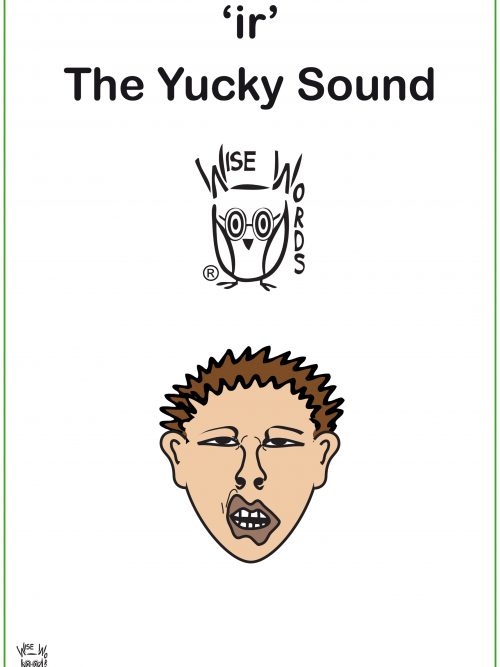
'The Yucky Sound'
Wise Words Articulation Programs support clinicians, teachers and parents to establish 'new' (correct) sounds into their child's speech. Each program supplies detailed instructions for every task and game. The instructions have been written in a clear manner for a non-professional to follow. Numerous games are provided. These games have been designed to be fun and interactive and will ensure that the child remains engaged and compliant. Playing the games will help the child to generalise the ‘new’ sound into their everyday speech. -
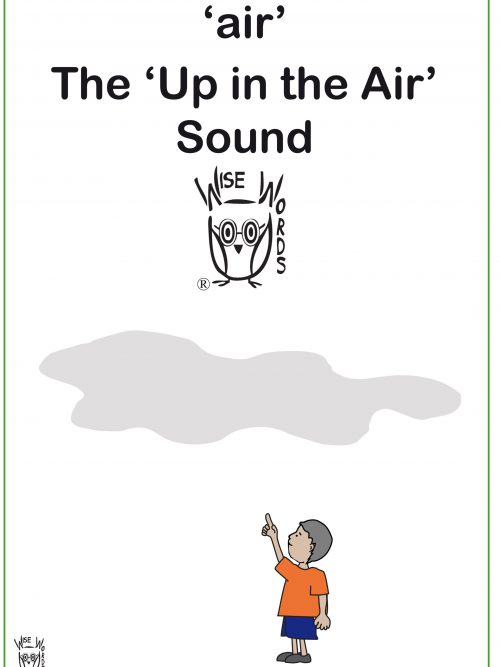
The 'Up in the Air' sound
Wise Words Articulation Programs - support clinicians, teachers and parents to establish 'new' (correct) sounds into their child's speech. Each program supplies detailed instructions for every task and game. The instructions have been written in a clear manner for a non-professional to follow. Numerous games are provided. These games have been designed to be fun and interactive and will ensure that the child remains engaged and compliant. Playing the games will help the child to generalise the ‘new’ sound into their everyday speech. -
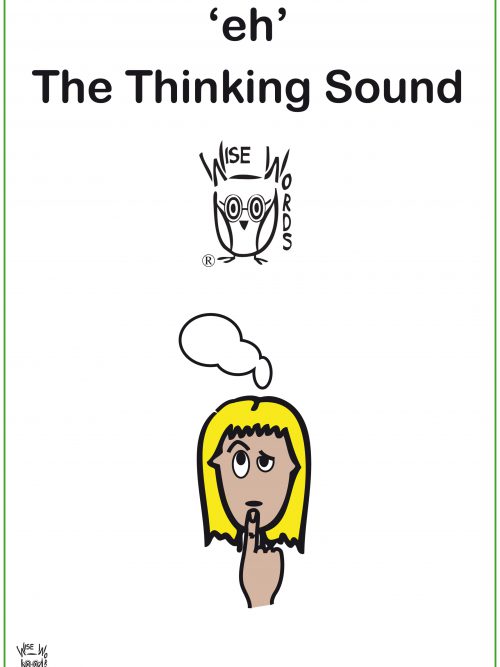
'The Thinking Sound'
Wise Words Articulation Programs - support clinicians, teachers and parents to establish 'new' (correct) sounds into their child's speech. Each program supplies detailed instructions for every task and game. The instructions have been written in a clear manner for a non-professional to follow. Numerous games are provided. These games have been designed to be fun and interactive and will ensure that the child remains engaged and compliant. Playing the games will help the child to generalise the ‘new’ sound into their everyday speech. -
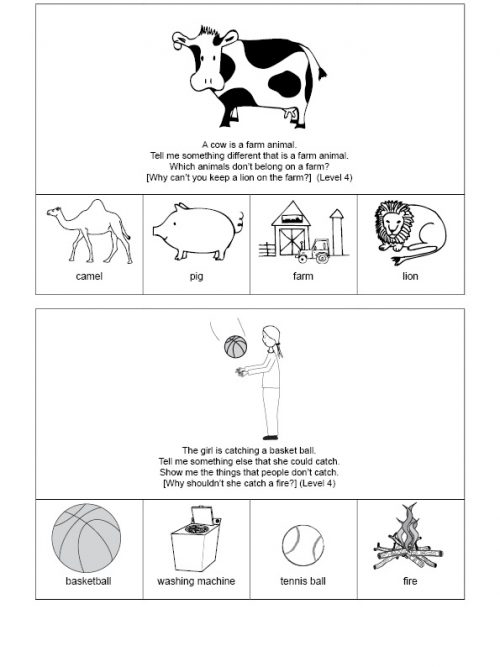
Level 3 (& Level 4)
Selecting an Object or Set of Objects by Exclusion Level 3 “Tell me something else that ...” “Tell me something different that ..." "Show me the things that aren’t ...” “Point to the things that don’t ...” “Find the things that the boy can’t ...” Reasoning & Problem Solving Level 4 “Why is a ... made of ...?" "What should he do if ...?" "Why wouldn't ...?" "What could you use to ...?" "What could you ... if ...?" This program targets Level 3 questions and statements. At this level of understanding, your child will need to look beyond the material in front of him. He will be required to evaluate and reorder the information. A typical skill in this category is the ability to exclude material. Your child will need to follow directions which may use the words ‘not, don’t, can’t, something else, other than’. The activities in this program have been designed specifically to help your child recognise alternatives. A number of Level 4 questions have been included in this program. These tasks will prove useful for those children who are working towards a more abstract type of question. Questions at this level include Why should ...? Why shouldn’t ...? Why can ...? Why can’t ...? What could ...? How can we tell ...? At this level of understanding, your child will need to look beyond the material in front of him/her and will then be required to evaluate and reorder the information. A typical skill in this category is the ability to exclude material. Your child will need to follow directions which may include the words ‘not, don’t, can’t, something else, other than’. The activities in this program have been designed specifically to help your child recognise alternatives. Example of a Level 3 Activity 1. “A cow is a farm animal. “Tell me something different that is a farm animal.” Your child is given the following possible answers: A camel - An animal but not a farm animal. A pig - The correct answer. This is an alternative farm animal. A farm - The place where farm animals are found. A lion - An animal but not a farm animal. 2. “Which animals don’t belong on the farm?” - “Camel, lion” Example of a Level 4 Activity 1.“Mum fills the kettle with water. How can we tell that the kettle is boiling?" 2. “Frogs can jump. Why can’t snails jump? -
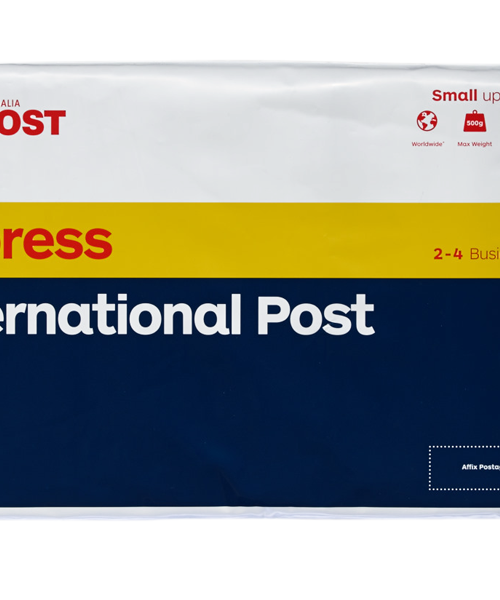 Shipping - International Express Post $55.00 guarantees delivery in 2 to 4 business days to metro areas of major international cities. Although Australia Post Airmail Service guarantees reliable delivery to over 200 countries, customs procedures in other countries have been known to delay the delivery of packages.
Shipping - International Express Post $55.00 guarantees delivery in 2 to 4 business days to metro areas of major international cities. Although Australia Post Airmail Service guarantees reliable delivery to over 200 countries, customs procedures in other countries have been known to delay the delivery of packages. -
Sale!
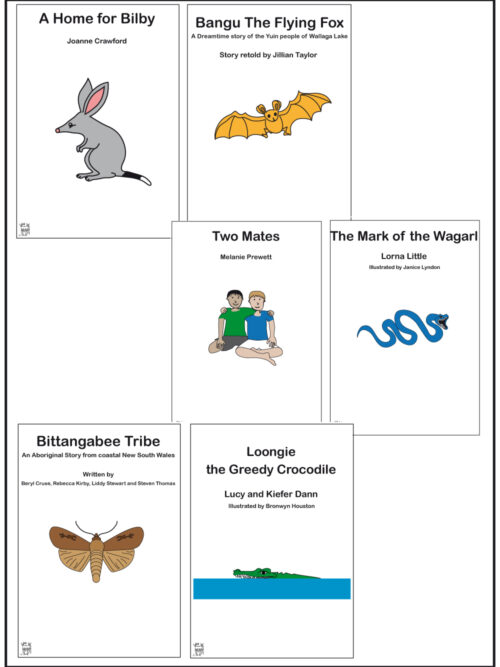 Wise Words indigenous materials have been devised to support parents, teachers and clinicians who may find it challenging to teach indigenous content because of concerns that they may not have the knowledge or understanding to ensure that the books, their stories and the complexity of the information is presented in a respectful and appropriate manner. With thanks to my editors Tara Lewis an Iman woman from the Taroom country of Western Queensland and Joedie Lawler a Biripi woman from Taree. Both Tara and Joedie ensured that the materials respected Aboriginal and Torres Strait Islander histories and were culturally appropriate. I am grateful for their input. Wise Words Scripts - offer clinicians, teachers and parents readily available questions designed specifically for each book. A script provides a variety of questions at each level of understanding for each page of the book. A teacher or clinician working with a group of children can tailor questions to each child's language ability. This script and other available scripts have been based on Marion Blank's Model of Classroom Language.
Wise Words indigenous materials have been devised to support parents, teachers and clinicians who may find it challenging to teach indigenous content because of concerns that they may not have the knowledge or understanding to ensure that the books, their stories and the complexity of the information is presented in a respectful and appropriate manner. With thanks to my editors Tara Lewis an Iman woman from the Taroom country of Western Queensland and Joedie Lawler a Biripi woman from Taree. Both Tara and Joedie ensured that the materials respected Aboriginal and Torres Strait Islander histories and were culturally appropriate. I am grateful for their input. Wise Words Scripts - offer clinicians, teachers and parents readily available questions designed specifically for each book. A script provides a variety of questions at each level of understanding for each page of the book. A teacher or clinician working with a group of children can tailor questions to each child's language ability. This script and other available scripts have been based on Marion Blank's Model of Classroom Language. -
Sale!
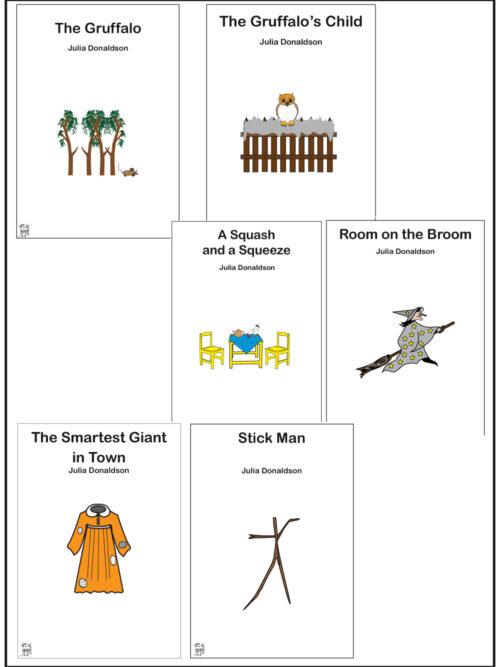
THE JULIA DONALDSON PACKAGE includes 6 books … • The Gruffalo • The Gruffalo’s Child • A Squash and a Squeeze • Room on the Broom • The Smartest Giant in Town • Stick Man
These scripts have been based on Marion Blank’s Model of Classroom Language. Marion Blank recognised the importance of keeping questions and statements within a child’s level of understanding. The more concrete the statement or question, the easier it will be for the child to understand. As questions become more abstract, they become harder for children to answer. The Blank Model is divided into 4 levels of questioning, moving from the concrete (easiest) at Level 1 to the abstract (most difficult) at Level 4.
-
Sale!
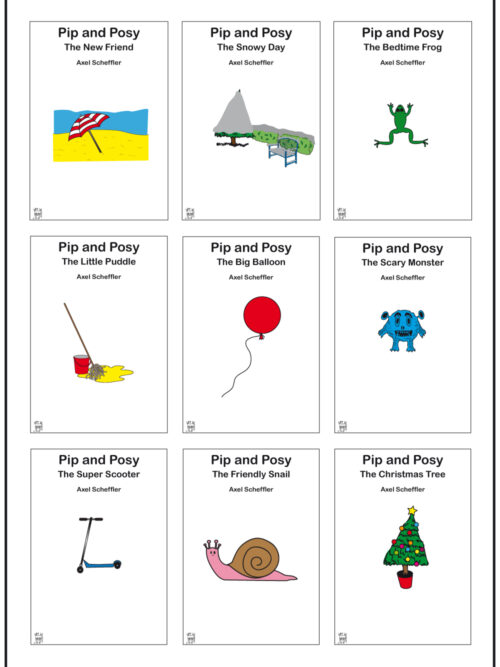 THE PIP & POSY TOTAL PACKAGE includes 9 books ... • Pip & Posy - The New Friend • Pip & Posy - The Snowy Day • Pip & Posy - The Little Puddle • Pip & Posy - The Bedtime Frog • Pip & Posy - The Big Balloon • Pip & Posy - The Scary Monster • Pip & Posy - The Super Scooter • Pip & Posy - The The Friendly Snail • Pip & Posy - The Christmas Tree These scripts have been based on Marion Blank's Model of Classroom Language. Marion Blank recognised the importance of keeping questions and statements within a child’s level of understanding. The more concrete the statement or question, the easier it will be for the child to understand. As questions become more abstract, they become harder for children to answer. The Blank Model is divided into 4 levels of questioning, moving from the concrete (easiest) at Level 1 to the abstract (most difficult) at Level 4.
THE PIP & POSY TOTAL PACKAGE includes 9 books ... • Pip & Posy - The New Friend • Pip & Posy - The Snowy Day • Pip & Posy - The Little Puddle • Pip & Posy - The Bedtime Frog • Pip & Posy - The Big Balloon • Pip & Posy - The Scary Monster • Pip & Posy - The Super Scooter • Pip & Posy - The The Friendly Snail • Pip & Posy - The Christmas Tree These scripts have been based on Marion Blank's Model of Classroom Language. Marion Blank recognised the importance of keeping questions and statements within a child’s level of understanding. The more concrete the statement or question, the easier it will be for the child to understand. As questions become more abstract, they become harder for children to answer. The Blank Model is divided into 4 levels of questioning, moving from the concrete (easiest) at Level 1 to the abstract (most difficult) at Level 4. -
Sale!
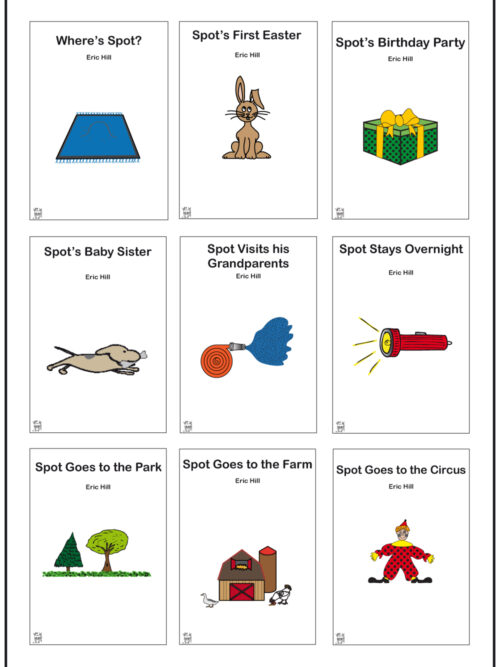 THE SPOT PACKAGE includes 13 books … • Where’s Spot? • Spot Goes to the Farm • Spot’s Birthday Party • Spot Visits his Grandparents • Spot’s Baby Sister • Spot Stays Overnight • Spot Goes to School • Spot Bakes a Cake • Spot’s First Easter • Spot Goes to the Park • Spot Goes to a Party • Spot Goes to the Circus • Spot Goes on Holiday These scripts have been based on Marion Blank’s Model of Classroom Language. Marion Blank recognised the importance of keeping questions and statements within a child’s level of understanding. The more concrete the statement or question, the easier it will be for the child to understand. As questions become more abstract, they become harder for children to answer. The Blank Model is divided into 4 levels of questioning, moving from the concrete (easiest) at Level 1 to the abstract (most difficult) at Level 4.
THE SPOT PACKAGE includes 13 books … • Where’s Spot? • Spot Goes to the Farm • Spot’s Birthday Party • Spot Visits his Grandparents • Spot’s Baby Sister • Spot Stays Overnight • Spot Goes to School • Spot Bakes a Cake • Spot’s First Easter • Spot Goes to the Park • Spot Goes to a Party • Spot Goes to the Circus • Spot Goes on Holiday These scripts have been based on Marion Blank’s Model of Classroom Language. Marion Blank recognised the importance of keeping questions and statements within a child’s level of understanding. The more concrete the statement or question, the easier it will be for the child to understand. As questions become more abstract, they become harder for children to answer. The Blank Model is divided into 4 levels of questioning, moving from the concrete (easiest) at Level 1 to the abstract (most difficult) at Level 4. -
Sale!
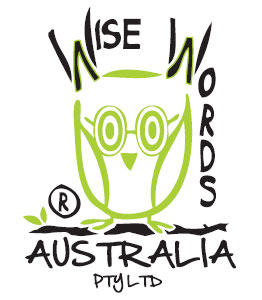 10% Discount Applied to Total Package (See individual programs for details and examples.) The Total Articulation Package includes 13 Articulation Programs. This consists of 6 consonant and 4 vowel programs. Consonant - 'L' Consonant - 'th' voiceless Consonant - 'th' voiced Consonant - 'r' Consonant - 's' Consonant - Minimal Pairs - 'k' vs 't' Consonant - Minimal Pairs - 'sh' vs 's' Consonant - Minimal Pairs - 'ch' vs 't' Vowel - 'ir' Vowel - 'air' Vowel - 'eh' Vowel - Minimal Pairs - 'ir' vs 'or' Wise Words Articulation Programs support clinicians, teachers and parents to establish 'new' (correct) sounds into their child's speech. Each program supplies detailed instructions for every task and game. The instructions have been written in a clear manner for a non-professional to follow. Numerous games are provided. These games have been designed to be fun and interactive and will ensure that the child remains engaged and compliant. Playing the games will help the child to generalise the ‘new’ sound into their everyday speech.
10% Discount Applied to Total Package (See individual programs for details and examples.) The Total Articulation Package includes 13 Articulation Programs. This consists of 6 consonant and 4 vowel programs. Consonant - 'L' Consonant - 'th' voiceless Consonant - 'th' voiced Consonant - 'r' Consonant - 's' Consonant - Minimal Pairs - 'k' vs 't' Consonant - Minimal Pairs - 'sh' vs 's' Consonant - Minimal Pairs - 'ch' vs 't' Vowel - 'ir' Vowel - 'air' Vowel - 'eh' Vowel - Minimal Pairs - 'ir' vs 'or' Wise Words Articulation Programs support clinicians, teachers and parents to establish 'new' (correct) sounds into their child's speech. Each program supplies detailed instructions for every task and game. The instructions have been written in a clear manner for a non-professional to follow. Numerous games are provided. These games have been designed to be fun and interactive and will ensure that the child remains engaged and compliant. Playing the games will help the child to generalise the ‘new’ sound into their everyday speech. -
Sale!
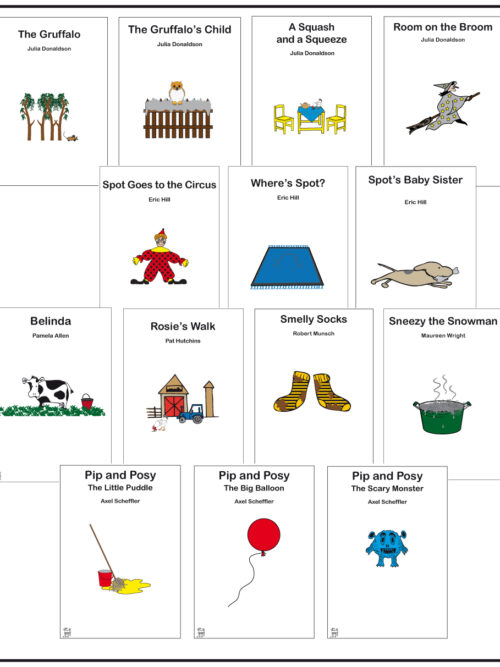 10% Discount Applied to Total Scripts Package (See individual programs for details and examples.) The Total Scripts Package includes 31 scripts: Sneezy the Snowman Rosie's Walk Smelly Socks Belinda The Gruffalo The Gruffalo's Child Stick Man The Smartest Giant in Town Room on the Broom A Squash and a Squeeze Pip & Posy - The Little Puddle Pip & Posy - The Friendly Snail Pip & Posy - The New Friend Pip & Posy - The Christmas Tree Pip & Posy - The Scary Monster Pip & Posy - The Bedtime Frog Pip & Posy - The Big Balloon Pip & Posy - The Snowy Day Pip & Posy - The Super Scooter Where's Spot? Spot Goes to the Park Spot Bakes a Cake Spot Goes to the Circus Spot Goes to School Spot Goes to a Party Spot Goes to the Farm Spot's Birthday Party Spot Visits his Grandparents Spot's Baby Sister Spot Stay's Overnight Spot Goes on Holiday Spot's First Easter USING BOOKS TO HELP YOUR CHILD UNDERSTAND QUESTIONS You can use books to expand your child's • Vocabulary (branch, shivered, paddock, melt, disguise, wind, poisonous, squelchy) • Understanding of concepts (warm, favourite, enormous, kind ) • Ability to understand questions Wise Words Scripts - offer clinicians, teachers and parents readily available questions designed specifically for each book. These scripts have been based on Marion Blank's Model of Classroom Language. Marion Blank recognised the importance of keeping questions and statements within a child’s level of understanding. The more concrete the statement or question, the easier it will be for the child to understand. As questions become more abstract, they become harder for children to answer. The Blank Model is divided into 4 levels of questioning, moving from the concrete (easiest) at Level 1 to the abstract (most difficult) at Level 4.
10% Discount Applied to Total Scripts Package (See individual programs for details and examples.) The Total Scripts Package includes 31 scripts: Sneezy the Snowman Rosie's Walk Smelly Socks Belinda The Gruffalo The Gruffalo's Child Stick Man The Smartest Giant in Town Room on the Broom A Squash and a Squeeze Pip & Posy - The Little Puddle Pip & Posy - The Friendly Snail Pip & Posy - The New Friend Pip & Posy - The Christmas Tree Pip & Posy - The Scary Monster Pip & Posy - The Bedtime Frog Pip & Posy - The Big Balloon Pip & Posy - The Snowy Day Pip & Posy - The Super Scooter Where's Spot? Spot Goes to the Park Spot Bakes a Cake Spot Goes to the Circus Spot Goes to School Spot Goes to a Party Spot Goes to the Farm Spot's Birthday Party Spot Visits his Grandparents Spot's Baby Sister Spot Stay's Overnight Spot Goes on Holiday Spot's First Easter USING BOOKS TO HELP YOUR CHILD UNDERSTAND QUESTIONS You can use books to expand your child's • Vocabulary (branch, shivered, paddock, melt, disguise, wind, poisonous, squelchy) • Understanding of concepts (warm, favourite, enormous, kind ) • Ability to understand questions Wise Words Scripts - offer clinicians, teachers and parents readily available questions designed specifically for each book. These scripts have been based on Marion Blank's Model of Classroom Language. Marion Blank recognised the importance of keeping questions and statements within a child’s level of understanding. The more concrete the statement or question, the easier it will be for the child to understand. As questions become more abstract, they become harder for children to answer. The Blank Model is divided into 4 levels of questioning, moving from the concrete (easiest) at Level 1 to the abstract (most difficult) at Level 4. -
Sale!
 10% Discount Applied to Total Package (See individual programs for details and examples.) The Total Language Package includes both assessment tools and ALL programs at all 4 levels of understanding. Assessments The Wise Words Screening Tool The Wise Words Screening Advantage Level 1 Matching Objects Level 2 Functions Lotto Fish for Functions Naming Functions Sorting Functions Matching Functions Functions Board Games Semantic Naming Semantic Sorting Semantic Lotto Semantic Matching Semantic Families Semantic Board Games Two Characteristics Barrier games Level 3 Identifying Parts of a Whole and Exclusions (Levels 2 - 4) Identifying Similarities and Differences (Levels 2 - 3) Word Definitions Mind Map 1 Word Definitions Mind Map 2 Word Definitions Mind Map 3 What Will Happen Next? Selecting an Alternative Negatives and Exclusions Explaining Similarities Identifying Objects Used Together Level 4 Explaining the Logic of Compound Words Explaining an Inference Justifying a Decision Based on Characteristics Selecting the Means to a Goal Selecting a Tool Predicting Changes in Position Explaining the Reason for an Action The Wise Words Screening Tool provides range of questions/instructions representing all four levels of Blank’s model. It offers two questions/instructions at each level for each picture presented. Space is provided beneath these questions for the clinician/teacher to transcribe the child’s response. This simple screening tool can be used to plan goals for children and will monitor a child’s progress over time. The Wise Words Screening Advantage offers an assessment tool which can be administered quickly. The provided tables enable a teacher or clinician to analyse responses, devise goals and track a child’s progress over time. The screener consists of 10 colour stimulus pictures with a range of questions/instructions representing all four levels of Blank’s model. All (twenty nine) Wise Words Language programs are included in this package. These programs have been designed to support a child's language development from the early, concrete language of a younger child to the older child where the perceptual language distance has increased significantly and where language is used to problem solve and reason about materials and experiences. The Blank's levels are fluid and the Wise Words Programs assist a child to work through each level to a higher level of understanding. Each program can stand alone. There are a number of different programs available at Levels 2 - 4 to ensure firm understanding and assist in generalisation. The instructions for the programs have been written for a lay person and give detailed information on how to use the program. All programs are printed in black and white to ensure fast, cost effective printing.
10% Discount Applied to Total Package (See individual programs for details and examples.) The Total Language Package includes both assessment tools and ALL programs at all 4 levels of understanding. Assessments The Wise Words Screening Tool The Wise Words Screening Advantage Level 1 Matching Objects Level 2 Functions Lotto Fish for Functions Naming Functions Sorting Functions Matching Functions Functions Board Games Semantic Naming Semantic Sorting Semantic Lotto Semantic Matching Semantic Families Semantic Board Games Two Characteristics Barrier games Level 3 Identifying Parts of a Whole and Exclusions (Levels 2 - 4) Identifying Similarities and Differences (Levels 2 - 3) Word Definitions Mind Map 1 Word Definitions Mind Map 2 Word Definitions Mind Map 3 What Will Happen Next? Selecting an Alternative Negatives and Exclusions Explaining Similarities Identifying Objects Used Together Level 4 Explaining the Logic of Compound Words Explaining an Inference Justifying a Decision Based on Characteristics Selecting the Means to a Goal Selecting a Tool Predicting Changes in Position Explaining the Reason for an Action The Wise Words Screening Tool provides range of questions/instructions representing all four levels of Blank’s model. It offers two questions/instructions at each level for each picture presented. Space is provided beneath these questions for the clinician/teacher to transcribe the child’s response. This simple screening tool can be used to plan goals for children and will monitor a child’s progress over time. The Wise Words Screening Advantage offers an assessment tool which can be administered quickly. The provided tables enable a teacher or clinician to analyse responses, devise goals and track a child’s progress over time. The screener consists of 10 colour stimulus pictures with a range of questions/instructions representing all four levels of Blank’s model. All (twenty nine) Wise Words Language programs are included in this package. These programs have been designed to support a child's language development from the early, concrete language of a younger child to the older child where the perceptual language distance has increased significantly and where language is used to problem solve and reason about materials and experiences. The Blank's levels are fluid and the Wise Words Programs assist a child to work through each level to a higher level of understanding. Each program can stand alone. There are a number of different programs available at Levels 2 - 4 to ensure firm understanding and assist in generalisation. The instructions for the programs have been written for a lay person and give detailed information on how to use the program. All programs are printed in black and white to ensure fast, cost effective printing.
